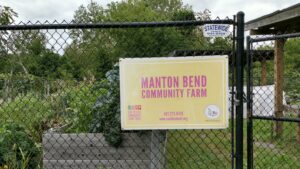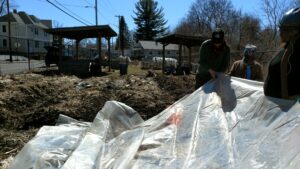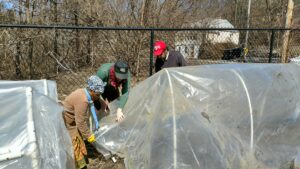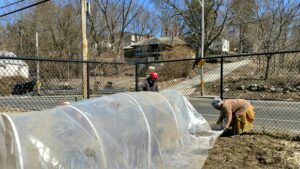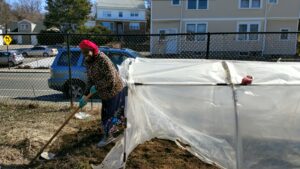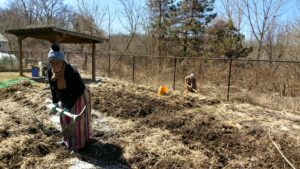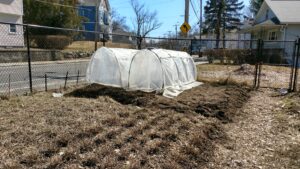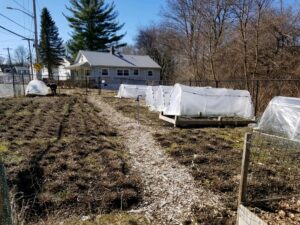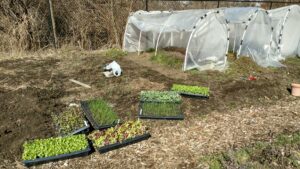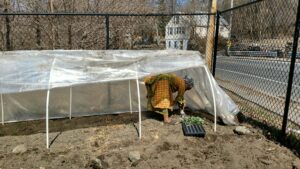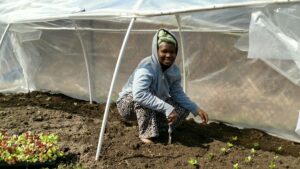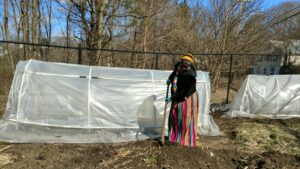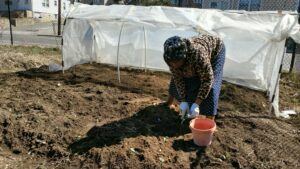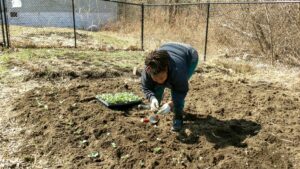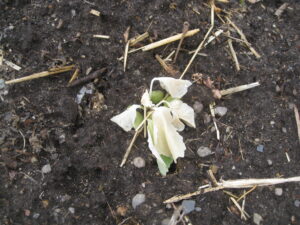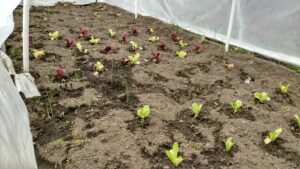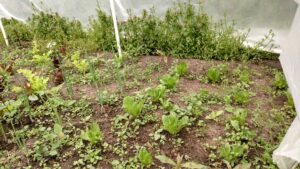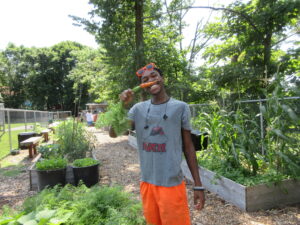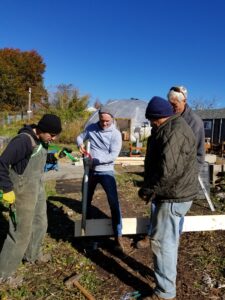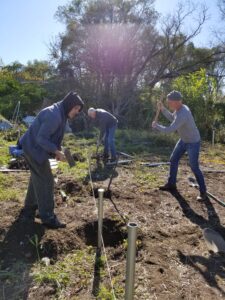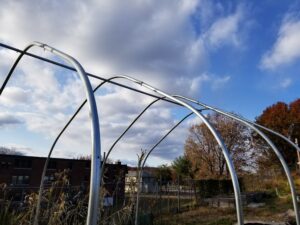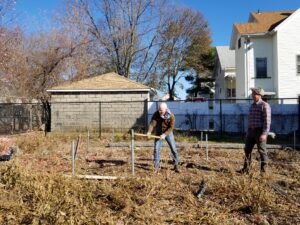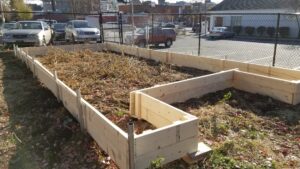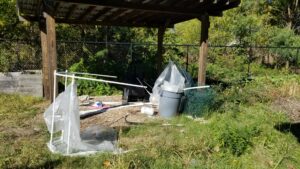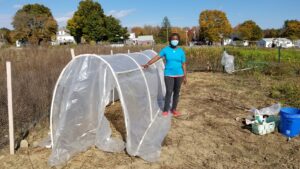Final report for NERI17-001
Project Information
Rhode Island is a small state with small farms. The average farm is less than 9 acres. To grow more produce many farmers extend the growing season by using tunnels. High tunnels and low tunnels have been used extensively in RI, but few RI farmers have used caterpillar tunnels (also called walk-in tunnels). Caterpillar tunnels are an option for many small, urban farms because they costs 1/4 - 1/3 the price of high tunnels, are easy to construct and cover, have excellent air flow, improved yield and quality of field-grown produce, and are easily moved to new locations. Some RI small growers have expressed interest in extending their growing season but, for various reasons, are not ready or able to construct high tunnels. RI's three-year SARE PDP project was to train RI Ag Service Providers and RI farmers to construct and use caterpillar tunnels to improve crop quality and quantity, and extend the production season.
Over the three years of this project, Ag Service Providers and farmers were trained to construct and use caterpillar tunnels. During Year 1, it was decided to work exclusively with immigrant urban farmers along with Southside Community Land Trust. Southside Community Land Trust has been building and managing community gardens in economically challenged urban neighborhoods in RI for 39 years. A lot of individualized effort is needed to work effectively with immigrant producers. This reduced the total number of Ag Service Providers and farmers trained, but assisted the historically underserved urban immigrant farming community. Year 1 and 2 focused on caterpillar tunnels, but at the end of Year 2 it was decided that the caterpillar tunnels were not meeting the needs of these urban farmers. In Year 1 and 2, we held workshops on caterpillar tunnel construction and use, and many caterpillar tunnels were built, but by the end of Year 2, very few tunnels were being used on urban farms. Feedback from farmers and Ag Service Providers indicated that the tunnels were too small and needed to be too closely monitored. Caterpillar tunnels were more beneficial when located where the farmer lives so the tunnels can be checked several times each day. Most immigrant urban farmers farm at community gardens, making it difficult to monitor the caterpillar tunnels as closely as needed. So for the 3rd year of the project, it was decided to work with URI Professor, John Taylor, who is researching the use of modified high tunnels in urban farms. These tunnels are 32' x 14', which is much larger than the 12' x 4' caterpillar tunnels, but smaller than traditional high tunnels.
Three modified urban tunnels were built on three urban farms along with Southside Community Land Trust Ag Service Providers in the fall of 2019. The tunnels were to be finished in the spring of 2020, with workshops on using the tunnels to follow. The pandemic prevented workshops from happening. The three tunnels should be completed in the spring of 2021, and workshops will be held to train Ag Service Providers and urban farmers.
Over the three years of this project 8 Agricultural Service Providers will provide training to 75 RI farmers on construction and use of caterpillar tunnels. These farmers will mostly be small acreage farmers, probably farming a total of 200 acres in Rhode Island.
Most vegetable farms in Rhode Island are very small, often an acre or less. One method to increase production on small acreage is to extend the growing season with tunnels or greenhouses. Many small growers can not afford nor have the space for high tunnels or greenhouses. Rhode Island's SARE project is to introduce small growers and their Agricultural Service Providers to caterpillar tunnels, also known as field tunnels. Agricultural Service Providers and growers will learn how to build caterpillar tunnels and how to grow crops using caterpillar tunnels.
Advisors/Cooperators
Educational approach
The original plan for this project was that URI Cooperative Extension personnel, Heather Faubert and Andy Radin, would conduct one on-farm trainings per year for Ag Service Providers and farmers where participants learn about the benefits of caterpillar tunnels and how to construct them. A second meeting each year would focus on crop production techniques for growing crops in caterpillar tunnels outlined in the Learning Outcomes.
Trainings would be held on RI working farms, with host farms recruited from a pool suggested by RI Ag Service Providers and farmers. Rhode Island is considered to be divided into three areas: Northern, Southern, and Eastern and demonstration farms would be in a different area of the state each year.
After training workshops, Ag Service Providers would be invited to visit farms where caterpillar tunnels have been constructed and are in use with key individuals Andy Radin and/or Heather Faubert to see firsthand the benefits of growing inside caterpillar tunnels. By seeing the caterpillar tunnels in use by growers and learning about growers’ experiences using the tunnels, the Ag Service Providers will be better able to advise other RI growers about constructing and using them.
Ag Service Providers would also receive a project-developed factsheet on how to build caterpillar tunnels, including the cost of materials needed for construction and where materials can be purchased, and how to manage crop production in the tunnels.
The course of this project shifted during the first year because during that time, years-long efforts to develop relationships with urban growers in the Providence area and service providers from community based organizations (CBOs) that support these growers began to bear fruit. One organization in particular, Southside Community Land Trust (SCLT), developed keen interest in the education this project is offering and they have become a key partner providing connection to growers and hosting workshops on their farms. SCLT started in 1981 and now owns or directly manages 21 community gardens in Providence, Pawtucket and Central Falls, and partners with schools, housing and community organizations to manage another 37 community gardens. SCLT owns or manages land used by 25 farmers, primarily African immigrants, to supply fresh fruits and vegetables to farmers markets, food businesses, restaurants, and CSAs. They also operate three farms in Providence and Pawtucket where they practice and demonstrate bio-intensive, small-scale agricultural production.
A high amount of individualized effort is needed to work effectively with immigrant producers and their support organizations, and because of this, the target audience of this project was narrowed to personnel from SCLT and associated community based organizations and the urban growers they support. The format and educational goals of the project did not changed, but we focused efforts on training a smaller, more focused group of urban ag service providers and producers, and providing more assistance to the service providers for their farmer education.
Revisions are needed for the third year of this project as well as for the second year. During Year 2, caterpillar tunnels were not well utilized by the urban farmers. Feedback I received indicated that the tunnels are too small. So for Year 3, I will work with URI Professor, John Taylor, who is researching the use of modified high tunnels in urban farms in collaboration with Southside Community Landtrust. These tunnels will be 32' x 14', so much larger than the 12' x 4' caterpillar tunnels. Farmers will be able to stand up inside the larger tunnels.
Third Year milestones will be the same, just the tunnel size is different.
Milestones
25 Agriculture Service Providers and 400 farmers receive advertisements for workshop on caterpillar tunnel construction and use. Workshop will be at a small vegetable farm in Rhode Island. (Spring 2018).
400
25
35
15
May 31, 2018
Completed
August 30, 2018
Meeting was advertised to growers and Ag Service Providers through Southside Community Landtrust (SCLT). It was not the original intention to limit this workshop to the SCLT community, but we are developing an excellent relationship with Southside Ag Service Providers and growers and want to continue working closely with them. Most of the farmers are recent African immigrants and speak very little English. Mixing the immigrant farming community with the general farming community was discouraged.
SCLT started in 1981 and now owns or directly manages 21 community gardens in Providence, Pawtucket and Central Falls, and partners with schools, housing and community organizations to manage another 37 community gardens. SCLT owns or manages land used by 25 farmers to supply fresh fruits and vegetables to farmers markets, food businesses, restaurants, and CSAs. They also operate three farms in Providence and Pawtucket where they practice and demonstrate bio-intensive, small-scale agricultural production.
6 Agricultural Service Providers and 20 farmers attend workshop to learn about caterpillar tunnel construction and how they can be used with a variety of crops. Thirty foot long caterpillar tunnel will actually be constructed at the workshop. Techniques for covering with different materials and venting will also be discussed and demonstrated. (Spring/Summer 2018).
20
6
8
5
July 31, 2018
Completed
September 21, 2018
We constructed 6 caterpillar tunnels at Manton Bend Community Farm in Providence with 5 Ag Service Providers from Southside Community Landtrust. Eight growers attended the workshop. Most of the growers manage plots at Manton Bend Community Farm. It was a very successful workshop and growers want to build more tunnels in the spring!
25 Agriculture Service Providers and 400 farmers receive advertisements for workshop on growing crops in caterpillar tunnels. Workshop will be at a small vegetable farm in Rhode Island. (Summer 2018).
400
25
35
15
April 07, 2018
Completed
March 21, 2018
Meeting was advertised to Southside Community Land Trust growers and organization. Transportation was provided for them to travel from Providence to URI in Kingston, RI on April 7th.
6 Agricultural Service Providers and 20 farmers attend workshop to learn how to grow various field crops in caterpillar tunnels. (Summer 2018).
20
6
5
6
August 31, 2018
Completed
April 07, 2018
Ag Service Providers and growers from Southside Community Land Trust came to URI Agronomy Farm and learned about early season crops that can grow in caterpillar tunnels on April 7th. All were impressed with early production despite very cold conditions and storms in March and early April.
Another meeting on constructing and using caterpillar tunnels is being planned for Summer 2018.
2 Ag Service Providers visit farm where workshop was held with Heather Faubert and/or Andy Radin and the host farmer. Ag Service Providers will witness growing conditions and learn about farmer's experiences and opinions on growing crops under caterpillar tunnel. Comparisons will be made to field grown crops. (Summer 2018).
2
12
6
August 31, 2018
Completed
August 06, 2018
Project leaders met with growers and Ag Service Providers at 3 different farms on 3 different evenings (June 11, July 9 and August 6). Field tunnels had not been constructed yet so the focus of these meetings was insect and disease identification. We discussed using field tunnels to decrease disease pressure and exclude some insect pests.
26 attendees of the workshop receive and respond to a follow-up evaluation.
(Fall 2018).
20
6
2
3
October 31, 2018
Completed
October 31, 2018
The project leader conducted in-person interviews about the value of the project with Ag Service Providers from Southside Community Land Trust and URI. The Ag Service Providers were pleased with the training and two Ag Service Providers hosted their own workshop on constructing caterpillar tunnels on October 1st.
The other Ag Service Provider has received requests on attending a tunnel construction workshop in 2019.
It was more difficult to survey the growers since their English is limited. Probably a better indication is the smiles on their faces and them wanting to build more caterpillar tunnels, and to find more land to grow on.
Revised Year 2 Milestones reflect changes described above.
2 Urban Agriculture Service Providers will agree to attend workshop on caterpillar tunnel construction and use at a community farm in Providence, RI. Urban Ag Service Providers will communicate to African immigrant farmers about workshop and encourage their attendance. (Spring 2019).
2
2
April 30, 2019
Completed
March 22, 2019
2 Ag Service Providers and 8 farmers attend workshop to learn about caterpillar tunnel construction and use. Several 12 foot long caterpillar tunnels will be constructed at the workshop. (Spring 2019).
8
2
4
2
May 31, 2019
Completed
March 26, 2019
Two Ag Service Providers and four Southside Community Land Trust African immigrant farmers participated in the workshop. We built/repaired and set up 9, 12' caterpillar tunnels at Manton Bend Community Farm in Providence, RI. The tunnels are to be used by the four farmers at the workshop plus two more farmers that were not able to attend.
3 urban Ag Service Providers will be invited to attend workshop on growing crops in caterpillar tunnels. Urban Ag Service Providers will communicate to African immigrant farmers about workshop and encourage their attendance. Workshop will be at the same community farm as the first workshop. (Spring 2019).
3
1
May 31, 2019
Completed
March 28, 2019
The April 1st workshop was primarily advertised at the March 26th workshop. Everyone at the March 26th workshop said they would be able to attend the April 1st workshop. Growers were told there would be free seedlings for them to plant in their tunnels.
2 Ag Service Providers and 8 farmers attend workshop to learn how to grow various cold season field crops in caterpillar tunnels. (Spring 2019).
8
2
5
June 30, 2019
Completed
April 01, 2019
This workshop did not turn out as planned. No one from Southside Community Landtrust (SCLT) or anyone else from URI was able to attend. The person from SCLT that has been most involved with this project got injured and couldn't attend. Andy Radin, from URI, wasn't able to attend either, but he and I grew seedlings for workshop attendees to plant in their caterpillar tunnels. We grew plants that would be appropriate to grow in April in tunnels. Seedlings included onion scapes, kale, several lettuces, and cabbage.
Five Manton Bend Community Farm farmers attended the workshop. After talking about the hardiness of the seedlings growers selected which seedlings they wanted to plant. Each farmer planted flats of different vegetables inside their tunnels and surrounding plots. There were plenty of plants so it was acceptable for them to try planting some outside of the tunnels as well as inside the tunnels.
Problems started when the growers were planting primarily outside of the tunnels. I went from grower to grower and suggested they plant inside the tunnels, and they said they would, but they wanted to plant outside first.
One major drawback of starting so early in the season is there no water at this farm or other farms with water provided by the City of Providence. I didn't know this ahead of time or I would have brought containers of water. The seedlings needed water so I left the workshop to buy water. When I returned the growers were still planting outside the tunnels and I couldn't persuade them to plant more seedlings inside the tunnels. I said the little seedlings would probably get killed by frost, but I couldn't change their minds.
Most plants planted outside of tunnels died over the next several weeks when temperatures went down into the 20s.
Only 3 of the 9 caterpillar tunnels were planted with seedlings. These seedlings grew well, but I think very little was harvested out of any tunnel. I revisited Manton Bend Community Farm several times in April and May. One out of three planted tunnels was tended and doing well.
A major problem with season extension in the city is The City of Providence has to turn on the water at the gardens. They have a set schedule when they do this. My contact at SCLT said water would be turned on the first week in April. I'm not sure when water was turned on, but it was after April 12th. It's very difficult to grow without a water source!
Same as original milestone: 3 Ag Service Providers visit farm where workshop was held in Year 1 or Year 2 with Heather Faubert and/or Andy Radin and farmer. Ag Service Providers will witness growing conditions and learn about farmers' experiences growing crops under caterpillar tunnel. Comparisons will be made to field grown crops. (Summer 2019).
3
2
August 31, 2019
Completed
September 26, 2019
My contact at Southside Community Landtrust was busy doing other activities, so we only visited Manton Bend Community Farm together once after the March 26th workshop. We talked on the phone and emailed several times. I was concerned about plants dying from cold and also not being watered until too late in the season. I had to take his advice of, "Don't sweat it."
As I mentioned, he and I communicated several times over the growing season and he connected me with another potential Ag Service Provider working at a different urban farm in Providence. Through this other person I conducted two workshops in July at the Mt. Hope Sharing Garden at Billy Taylor Park. The workshops focused on pests and pest management. Even though this garden had no caterpillar tunnels, I thought this could an opportunity to work with another ASP in Providence. In addition to the ASP at Billy Taylor, I also worked with an intern working at the garden.
Workshop attendees (Ag Service Providers and farmers) will be interviewed about what they have learned and how the workshops have been helpful for them, what additional learning needs they have, and how they have been able to use what they’ve learned growing crops in caterpillar tunnels. (Fall 2019).
8
3
1
1
September 30, 2019
Completed
October 30, 2019
I interviewed the one SCLT employee and one African immigrant farmer about the project. The SCLT Ag Service Provider and I discussed how some of the constructed tunnels should probably be moved to a different urban farm where they will hopefully get better used. We plan on moving tunnels during the winter of 2020.
The one farmer I interviewed said she is not interested in using the caterpillar tunnels again. She said they are too small.
Ag Service Providers and farmers at Southside Community Land Trust receive a poster created by the project leader that shows steps involved with building a caterpillar tunnel and includes many pictures of the immigrant farmers. It will also show crops growing in the tunnels. (Fall 2019).
8
2
September 30, 2019
Completed
October 31, 2019
I don't think this is such a good idea any more. I feel like we haven't been successful with the caterpillar tunnels up to this point. Right now I don't feel as though I should promote using caterpillar tunnels. For my third year of this project I plan to work with a URI professor, John Taylor, who is working with larger tunnels on urban farms.
2 Urban Agriculture Service Providers will agree to attend workshop on modified urban high tunnel construction and use at a community farm in Providence or another city in RI. Urban Ag Service Providers will communicate to underserved farmers about workshop and encourage their attendance. (Spring 2020).
2
2
March 31, 2019
Completed
October 07, 2019
At the end of the second year of this project it was decided that the caterpillar tunnels were not meeting the needs of Rhode Island urban farmers. The tunnels were too small, and seemed more appropriate for home gardens where the caterpillar tunnels could be closely monitored.
The project shifted to building and using larger tunnels with URI Plant Sciences professor, John Taylor, Southside Community Land Trust (SCLT), and SCLT farmers. The proposed urban tunnels would be 32' x 14', which are much smaller than typical high tunnels, but much larger than the 12' x 5' caterpillar tunnels.
John Taylor and I met with the Director of Farmland Access and Education from Southside Community Land Trust (SCLT) to plan future urban tunnel building workshops. SCLT advertised the workshops to their farmers.
2 Ag Service Providers and 8 farmers attend workshop to learn about modified urban high tunnel construction and use. 32' x 14' modified urban high tunnels will be constructed at the workshop. Modified urban high tunnels will be USDA NRCS approved and information will be available about getting funding for NRCS practices (Spring 2020).
8
2
1
3
May 31, 2020
Completed
November 22, 2019
Over 7 days in October and November, three urban tunnels were built on lots or community farms in three Rhode Island cities: Providence, Pawtucket, and Central Falls. The tunnels were built by John Taylor, from URI, three Southside Community Land Trust employees, one urban farmer, two volunteers, and me.
Providence urban tunnel construction:
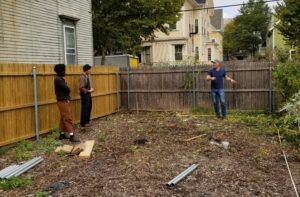
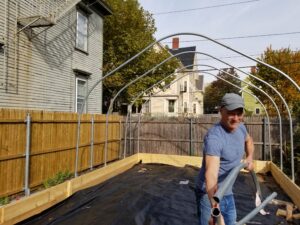
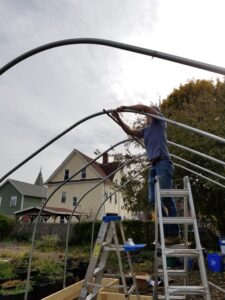
Pawtucket urban tunnel construction:
Central Falls urban tunnel construction:
3 urban Ag Service Providers will be invited to attend workshop on growing crops in modified urban high tunnels. Urban Ag Service Providers will communicate to underserved farmers about workshop and encourage their attendance. Workshop will be at the same community farm as the first workshop. (Spring 2020).
3
May 31, 2020
Incomplete
Due to the Covid pandemic, no additional workshops were planned or held. URI and Southside Community Land Trust did not host any in person events from March through the end of 2020.
2 Ag Service Providers and 8 farmers attend workshop to learn how to grow various cold season field crops in modified urban high tunnels. (Spring 2020).
8
2
June 30, 2020
Incomplete
The original plan was to cover the tunnels with plastic and hold a demonstration workshop in the spring of 2020. The pandemic prevented us from covering the tunnels and being able to use them in 2020. The tunnels will be covered in November 2020, and will then be used by urban farmers in 2021. Three Southside Community Land Trust employees (Ag Service Providers) were trained on building urban tunnels. I'm grateful we were able to complete most of the construction of three urban tunnels before being shut down by Covid-19.
Same as original milestone: 4 Ag Service Providers visit farm where workshop was held in Year 1 or Year 2 with Heather Faubert and/or Andy Radin and farmer. Ag Service Providers will witness growing conditions and learn about farmers' trials and triumphs of growing crops in modified urban tunnels. Comparisons will be made to field grown crops. (Summer 2020).
4
August 31, 2020
Incomplete
We did not plan any in person visits to farms with other Ag Service Providers due to Covid-19.
Workshop attendees (Ag Service Providers and farmers) participate in interviews with the project leader to share what they have learned and how the workshops have been helpful for them, what additional learning needs they have, and how they have been able to use what they’ve learned growing crops in modified urban high tunnels. (Fall 2020).
8
4
3
2
September 30, 2020
Completed
September 30, 2020
The Season Extension with Caterpillar Tunnels project did not deliver expected results, but did deliver many learning outcomes. At the completion of the project I spoke with two Ag Service Providers and two farmers that participated at some point over the past 3 years. The Ag Service Providers both thought the caterpillar tunnels are too small, and hopefully the new, larger urban tunnels (32' x 14') will better suit the needs of RI urban farmers. One Ag Service Provider said that the plastic cover was removed from one of the tunnels, and the grower used the frame to trellis caigua. The plastic cover was removed from other tunnels and used to solarize soil to manage weeds.
The Ag Service Providers said that many urban farmers are very interested in season extension, especially in the spring. The larger, urban tunnels should work better extending the season than the smaller, caterpillar tunnels. Caterpillar tunnels are easy to construct and are much cheaper than larger tunnels, but seem to be too small and need to be monitored too closely.
Some of the caterpillar tunnels from year 1 and 2 of the project are still being used. In 2018, 9 caterpillar tunnels were constructed on one urban community farm. Of these 9, one is still being used on the farm, and one was moved to a different farm a few miles away. In September, 2020, I helped set up the caterpillar tunnel on the other farm.
Caterpillar tunnels not being used where 9 were set up at an urban community farm in 2018:
One caterpillar tunnel was moved in to another farm in fall of 2020 to be used in 2021:
Milestone activities and participation summary
Participation summary:
Learning Outcomes
Year 1: ASP from Southside Community Landtrust held his own field tunnel construction workshop after attending the RI SARE workshop. I assisted with this workshop and one Nepalese grower intended to build a tunnel on some of his land.
Growers at both workshops learned about what crops grow best in caterpillar tunnels, especially late into the fall and early spring. One grower planted scallions and leeks in her tunnel constructed in September. Growers also learned about rolling up the sides of the tunnels when the weather was greater than 50 degrees and sunny.
Year 2: New ASP for Year 2 took pictures at pest workshop to share with urban students who work in the Mt Hope Sharing Garden in Providence.
Year 3: Contacted and spoke to two urban farmers and three Ag Service Providers in person to get their feedback on the use of caterpillar tunnels and larger urban tunnels. Verified a change in knowledge that caterpillar tunnels do not meet the needs of most urban farmers. Several Ag Service Providers are now aware that many urban farmers are interested in season extension. Trainings will be conducted in 2021 on using the urban tunnels, and hopefully more urban tunnels will be constructed for urban farmers to use.
Performance Target Outcomes
Performance Target Outcomes - Service Providers
Target #1
Over the three years of this project 8 ASP will provide training to 75 RI farmers on construction and use of caterpillar tunnels. These farmers will mostly be small acreage farmers, probably farming a total of 200 acres in Rhode Island
200 acres
| Year 1 | Year 2 | Year 3 |
|---|---|---|
| 1 | 2 |
Trained ASP conducted his own workshop on building caterpillar tunnels after receiving training at URI's SARE caterpillar tunnel building workshop. During Year 2, ASP continued to advise growers on farm with caterpillar tunnels. A second ASP in Year 2 took pictures of pests during July workshops to share with urban youths working in the Mt. Hope Sharing Garden.
| Year 1 | Year 2 | Year 3 |
|---|---|---|
| 4 | 4 |
| Year 1 | Year 2 | Year 3 |
|---|---|---|
1 acre |
1 acre |
| Activity | Year 1 | Year 2 | Year 3 | Total |
|---|---|---|---|---|
| Consultations | 4 | 4 | 0 | 8 |
| Workshops and field days | 1 | 2 | 0 | 3 |
Year 1: Through in-person interviews I learned that one trained ASP conducted his own caterpillar building workshop after attending the RI SARE workshop. I assisted with this workshop and one Nepalese grower intended to build a tunnel on some of his land. The ASP also talked to several growers (at least 5) wanting assistance in building caterpillar tunnels in 2019. I talked to two other ASP present at the URI SARE trainings and they do not intend to hold their own tunnel building or use workshops.
Year 2: One ASP from Southside Community Landtrust is interested in moving caterpillar tunnels constructed in Year 2 to other urban farms where hopefully they will be better utilized than where they are now. He and I will do this together in the winter of 2020. The new ASP I worked with in 2019 trained students who volunteer at the Mt. Hope Sharing Garden. She used pictures of pests that I taught her about at the workshops in 2019. I assisted her in identifying insects in the pictures and writing descriptions of the insect damage and management techniques on urban farms.
Performance Target Outcomes - Farmers
Target #1
5
Construct caterpillar tunnel and extend growing season with crops produced under tunnels.
1.5 acres
1
Caterpillar tunnel is up and grower is growing late into the fall of 2018 in one of her new tunnels. She constructed 3 tunnels and will grow in all 3 in 2019.
1
Caterpillar tunnels were constructed on 5 growers' plots, though only one started actually growing in tunnels in 2018. Three other growers have tunnels ready to go for 2019 growing. This information was obtained by helping 4 growers construct tunnels on their plots. The fifth grower told me he is going to construct at least one tunnel.
Additional Project Outcomes
| Year 1 | Year 2 | Year 3 | Total |
|---|---|---|---|
| 0 | 1 | 1 | 2 |
| Year 1 | Year 2 | Year 3 | Total |
|---|---|---|---|
| 0 | 1 | 1 | 2 |
| Year 1 | Year 2 | Year 3 | Total |
|---|---|---|---|
| 1 | 1 | 1 | 2 |
Working with urban farmers and urban Ag Service Providers is nothing like working with farmers and Ag Service Providers in rural settings. I've enjoyed developing relationships with the immigrant farmers and the Ag Service Providers that work closely with Rhode Island's immigrant farmers. Though my next SARE project does not have me working directly in urban agriculture, I hope to continue to build a good working relationship with the urban farmers and urban Ag Service Providers.
I am extremely pleased with the outcome of Rhode Island's first year of this project. We have made strong and stable relationships with Southside Community Landtrust and immigrant farmers they work with. We look forward to continuing this work in 2019 and 2020.
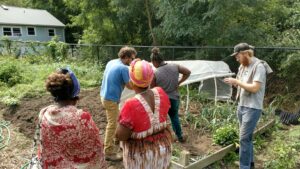
September 21, 2018 workshop on caterpillar tunnel construction.
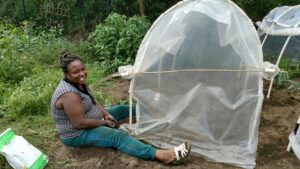
Sept 21, nearly completed tunnel.
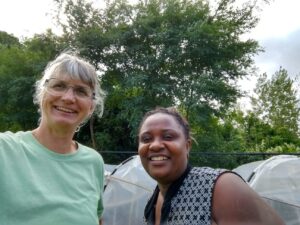
Sept 21. Success!
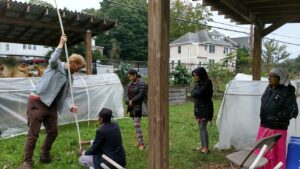
Oct 1, 2018 workshop put on by ASP.
Fall 2020:
Though the caterpillar project did not end with expected results, there were many benefits. One Ag Service Provider I worked closely with said, "Some things we've learned over the past few years are that people's biggest interest/motivation in season extension is in early propagation; so building and connecting people to greenhouses is increasingly a priority. And of the few who have used little caterpillar tunnels well, it seems to work best when at their home garden, since they are there anyway, and it's easy to keep an eye on it. Most of the women at Manton Bend Community Farm don't actually live very near there, so checking on things in winter is not very practical. Oh well, hindsight is 20-20."
Promoting and using larger, urban tunnels, may be very beneficial to the urban farmers. While urban tunnels aren't greenhouses, they are much cheaper to build than greenhouses and function better than caterpillar tunnels. NRCS provides cost-sharing for urban tunnels, so hopefully this will also aid Rhode Island's urban farmers.
Holding workshops for immigrant farmers is different than holding workshops for traditional farmers. Southside Community Land Trust has been working with urban immigrant farmers for 39 years. We followed Southside's lead on planning and hosting workshops. When working with urban farmers it is essential to work with existing community organizers.
SARE Outreach
I provided SARE outreach material at RI Fruit Grower Association meetings and the RI Raised Livestock Association Annual Meeting. I also talked individually to many growers about applying for SARE grower grants and two farmers I talked to submitted farmer grant applications for 2019. I also contact URI professors with information about SARE graduate student grants.
